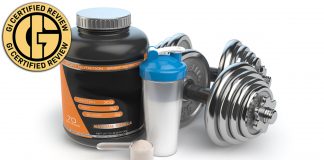The FDA has placed many peptides as a schedule 2 drug. What does that mean for bodybuilding?
In a recent episode of Generation Iron and Barbend’s The Mike O’Hearn Show, host Mike O’Hearn welcomed John Tsikouris, the owner of Titan Medical, a hormone replacement therapy clinic, to discuss the FDA’s unexpected shift in its stance on peptides. This regulatory change has sent shockwaves through the medical, fitness, and pharmaceutical industries, leaving many scrambling to understand the implications.
Last week, it was announced that the FDA had updated its list of substances nominated for use under section 503A. Notably, a large selection of peptides were placed as a schedule 2 drug. In simple terms, this means the FDA believes that the risk outweighs the medical benefits for these substances and can lead to regulation of these substances in the near future.
For many health clinics, this has turned on the emergency alarm in the health and fitness world. After the COVID-19 pandemic, health and hormone clinics alongside peptide substances grew in popularity. Peptide protocols were seen as a safe way to improve your health and fitness – and the clinics provide a professional way to evaluation your body for proper prescriptions.
While it is still early, it now seems like this boom in the health clinic and peptide world is about to change. That’s why Mike O’Hearn has brought back John Tsikouris to discuss the details of what is happening since the FDA announcement. John is the owner of Titan Medical – a hormone replacement therapy clinic that will certainly be directly affected by this decision. Let’s jump into the recap.
View this post on Instagram
The FDA’s New Perspective on Peptides
John Tsikouris kicked off the conversation by shedding light on the FDA’s recent decision to classify a majority of beneficial peptides as Schedule 2 substances. This new classification implies that the FDA considers these peptides to carry more risks than medical benefits, a decision that has taken many in the industry by surprise. This abrupt shift in scheduling has left everyone in the medical, fitness, and pharmaceutical sectors puzzled about what to do next.
One theory raised by John Tsikouris is that lobbyists may have played a role in pushing the FDA towards this decision. The rationale behind this theory is that the pharmaceutical industry benefits more when people remain unhealthy and rely on more expensive treatments. This change could potentially align with Big Pharma’s interests, leading to speculation about their influence.
Regardless of whether or not this theory is true, the end result is that certain health care options for many individuals may completely disappear.
What Are Peptides?
Peptides are short chains of amino acids, which are the building blocks of proteins. They are a crucial component of biological processes in living organisms. These substances are smaller than proteins and typically consist of between 2 to 50 amino acids, although there is no strict definition regarding their maximum size. They play various roles in the body, including:
- Hormone Regulation: Some peptides act as hormones, like insulin, which regulates blood sugar levels. Others, like growth hormone-releasing peptides, stimulate the production of growth hormone.
- Enzyme Activity: Certain peptides function as enzymes, catalyzing chemical reactions in the body. Examples include ribonuclease, which breaks down RNA molecules, and trypsin, which aids in digesting proteins.
- Neurotransmission: Neuropeptides are involved in the communication between nerve cells in the brain and throughout the nervous system. Examples include endorphins and substance P.
- Immune Response: Some peptides are part of the immune system, such as antimicrobial peptides, which help the body defend against bacteria, viruses, and other pathogens.
- Structural Support: Collagen and elastin are examples of peptides that provide structural support to tissues like skin, cartilage, and tendons.
- Cell Signaling: Peptides can act as signaling molecules, transmitting information between cells. For example, cytokines are peptides that regulate immune responses.
- Drug Development: In medicine, synthetic peptides are used to create drugs and therapeutic treatments for various conditions, including cancer and autoimmune diseases.
Due to their diverse functions and roles in the body, peptides have gained significant attention in medical research, particularly in fields like hormone replacement therapy, immunology, and drug development. They are used in a wide range of applications, from cosmetics and skincare products to pharmaceuticals. Their versatility and importance make peptides a subject of ongoing scientific investigation and innovation.
The Future of Peptides in Pharmacies
John mentioned that, as of now, the FDA has not declared it illegal for pharmacies to obtain peptide substances. However, future regulations could pose challenges, potentially leading many pharmacies to cease stocking and ordering these substances.
“Unknown” is a bad business model – so many pharmacies may play it safe until more clarification becomes available on the future of peptides.
The Fate of Specific Peptides
The FDA’s decision to categorize almost all beneficial peptides together has raised questions about whether they will later reconsider and exempt certain substances in this category from the Schedule 2 classification.
As it stands now, all of the peptides listed were placed as schedule 2 for the same reason. But as John points out, each peptide can have completely different effects. So the universal reasoning on this is suspect.
Due to this, John could see a future where, after more scrutiny, certain peptides become reversed. But this could be a long term change and for the moment is completely unknown.
Peptides Still Approved by the FDA
While many peptides have been reclassified, some of them have previously been approved by the FDA. Due to this, they cannot be regulated in the same way as the peptides listed in this latest update.
Peptides still fully available are:
- Sermorelin
- PT141
- Tirzepatide
- Semaglutide
This means individuals seeking help with weight loss, libido enhancement, and GH/RH peptides will continue to have options, although clinics like Titan Medical may need to adapt their strategies.
A Potential Long-Term Solution
John mentioned that he has had conversations with some scientists that are exploring the molecular structure of peptides to create similar but legally different compounds as a potential solution. The idea behind this is to find peptides with similar results that are just different enough to not be categorized as a schedule 2 substance.
However, this would be a long-term endeavor, and its success remains uncertain. As all things with this ruling, the surprise decision leaves much up in the air until more time can be dedicated to solutions.
BCAAs vs. Peptides
Branch Chain Amino Acids (BCAAs) remain legal and safe as over-the-counter supplements, in contrast to peptides. Mike O’Hearn is curious why BCAAs are perfectly legal while peptides are being classified as schedule 2 substances.
John speculates that the FDA’s concerns might be related to the length of amino acid chains in peptides, although he finds no sound reason behind this distinction.
Comparing Peptides to SARMs
Mike O’Hearn pointed out that he has rarely heard of negative side effects associated with peptides, whereas Selective Androgen Receptor Modulators (SARMs) are known for their side effects, which can be things like water retention or testosterone suppression, often similar to anabolic steroids. SARMs have a reputation in the bodybuilding and fitness world for high risk and high reward use.
John clarified that, currently, SARMs are not classified by the FDA. While this means they are not technically legal for human consumption, they can be sold legally as “testing substances,” exploiting a legal loophole that makes SARMs easily obtainable in the United States.
Will This Decision Benefit The Black Market?
John expressed concern that the FDA’s crackdown on peptides might inadvertently drive their sales into the black market, similar to how SARMs are sold through loopholes. This shift would compromise safety for users, as they would be uncertain about the quality and safety of the substances they acquire.
Essentially, clinics today offer a professional and legitimate way to get a blood test and have the correct substances recommended for your body. It also allows you to remain monitored through the process of using peptides.
Now, if things turn towards the black market, individuals will lose this safety net and be left making educated guesses as to what is best for their needs.
The Role of Studies and Public Outcry
John emphasized the importance of public outcry and how it can help reverse FDA decisions. But what is most important is that the scientific community continue to conduct more studies on peptides to strengthen their credibility. Medical professionals advocating for peptides within the government can also play a vital role in potentially influencing the FDA’s ruling.
Wrap Up
The FDA’s recent reclassification of peptides to Schedule 2 substances has sparked considerable debate and uncertainty in various industries. The future of peptides remains uncertain, and it will likely take significant efforts, such as medical professional advocacy and scientific studies, to influence potential changes in this regulatory decision. Meanwhile, those seeking peptide-based treatments can still find options among the FDA-approved peptides, and the industry continues to explore creative solutions for the long term.
You can watch the full episode of The Mike O’Hearn Show above. And don’t forget to check back every Friday for new episodes only on the Generation Iron Fitness Network or wherever podcasts are downloaded.















